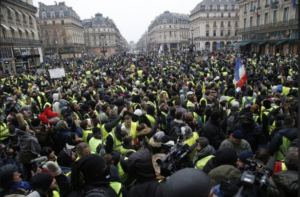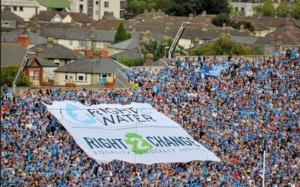What’s With the Yellow Vest Protests in France Against a Diesel Fuel Tax
A Push Back on Carbon Pricing, or Something Else?
The recent “Yellow Vest” protests in France against a new diesel fuel tax have raised all sorts of questions about whether there is a new or growing pushback against carbon taxes or carbon pricing.[1] The issue is whether the public is willing to pay new or increased taxes on any fossil fuel. Such taxes typically represent an attempt to reduce consumer use of fossil fuel by making it more expensive, all in the name of fighting against climate change. A carbon tax is but one form of carbon pricing, as is cap and trade of carbon emissions.
Many supporting the fight against climate change have argued for carbon taxes as an efficient, proven, economic-environmental policy that is easy to administer (in contrast to cap and trade) with an existing taxing authority bureaucracy for implementation.
So it is understandable that many were surprised by the Yellow Vest vehemence against new fuel taxes and concerned that this could signal some larger pushback against a pillar of the climate change fight.
The problem for determining the meaning of the protest is that the protesters themselves have so many different reasons for putting on a yellow vest. And commentators have as many explanations as there are commentators. We’ll add our two cents on the issue.

The Yellow Vest protest may well have resulted from circumstances in France unrelated to the fight against climate change. The French have supported progressive EU action on climate change action, in contrast to the Australians and Republicans in the US, so the protests against fossil fuel taxes were not expected. The problem more likely is the way in which the tax was imposed by President Macron. Before imposing the diesel fuel tax, Macron had already cancelled a surtax paid by France’s wealthiest people, relaxed rules to make it easier to fire and hire workers, and reduced pensions for railway unions. Is it any wonder that the working class were disturbed by the new tax, especially in rural areas where cars and fuel are indispensable. In contrast the urban French communities generally have access to public transportation, and the rich are largely unaffected by small fuel taxes. So certainly part of the force behind the protests is the growing inequality between those who have and those who don’t.
It has also been suggested that Macron’s unveiling of the tax was hindered by his lack of prior political experiences since his party did not exist before the presidential elections and he had no local mayors to test the market on his policies. A certain autocratic approach was not helpful and seemed to reflect a government uncaring of its working classes — a not unfamiliar refrain in many places these days.
This is not to suggest that we should dismiss the Yellow Vest protests as simply a function of local French politics, unrelated to climate change action. For we have seen other carbon pricing mechanisms run into deep resistance lately. For example, Washington State, a progressive state (think Seattle and coffee shops) proposed a carbon “fee” (taxes for the meek) on fossil fuel companies for each ton of carbon dioxide released into the atmosphere. The proposal was defeated. And Prime Minister Justin Trudeau of Canada has experienced some entrenched opposition to his carbon pricing initiatives.
In both Washington State and Canada we see one factor that affects the outcome of any such initiative. It is all too familiar and grows out of the tobacco companies fight against non-smoking legislation. The well-funded oil and gas and coal interests continue to spend lavishly on fighting any political action that smacks of carbon tax, or cap and trade. Think of any coal company, ExxonMobil and, especially, the Koch Brothers.
At the same time, many working and non-working class people in many places may have good reasons to be suspicious of, if not hostile to, fossil fuel taxes. There has always been a concern that the environmental movement has been dominated by affluent middle-class activists and that the working class is marginalized within the movement. Usually this issue was raised in conversations about the movement itself. Lately it has surfaced as an issue with attempts to implement specific climate change actions, including carbon pricing. Certainly coal miners and even some auto workers have joined in opposition to such initiatives as they directly affect their livelihoods, and they are demanding a Just Transition to move from fossil fuel jobs to something else.
What is particularly disturbing is when the fossil fuel monied interests target, and manipulate, working class interests to build opposition to climate actions. It is just such attempts to undermine climate action that require the most sustained and clear counter-messaging, and support for dealing with the economic impacts on working classes (and developing countrtries) from efforts to switch to a carbon-free world.
Ireland is not immune to these forces. Carbon taxes, on motor gas, diesel and home heating oil, have been part of the Irish landscape since 2010. The carbon taxes were part of the Programme of Government, 2007-12, for the Fianna Fail-Green Coalition, and were part of a movement by the Greens to move Ireland towards a Green Economy. They were carefully planned and tied to the long-established EU Emission Trading Scheme, which had been around for some time. There was no broad opposition or protests to these carbon taxes.

Yet around the same time, Ireland introduced water charges, which are similar to fuel taxes as they are both designed to reduce consumer usage of a fundamental natural resource. The water charges provoked protests akin to the Yellow Vests. As in the French protests against fuel taxes, the context for the recent introduction of water charges in Ireland may be helpful.
The charges were directly tied to the National Recovery Plan and a condition to the arrangements for the EU-IMF bailout of Ireland in 2010 (or an excuse by the government to impose water charges). Part of that Plan was also the creation of Irish Water to handle all water issues, including installation of water meters and collection of charges. It did not help matters that Irish Water spent €85 million on consultants by 2015, and that Irish water spent €180million to set up, and that employees were entitled to bonus payments, even if their performances were sub-par. In other words, the then Irish government’s rollout of water charges was less than brilliant.
We ignore such concerns about climate action at our peril, and to the peril of the planet. And we need to be ever more cafeful in how we try to persuade or sell climate change actions.
At the same time, we should not read too much into the Yellow Vests as carbon taxes have been introduced in 40 countries and more than 20 cities, states and provinces, and more are planned without widespread opposition. In total the World Bank reports that they cover about 13% of annual greenhouse gases and remain the most efficient way for businesses to determine how and when to invest in clean technology. See BBC News, below.
[1]The demonstrators take their name from the fluorescent hazard vests that all drivers in France have to carry in their vehicles and are used in emergencies.
Sources
Cory Doctorow, “Yellow Vests stand for and against many contradictory things, but are united in opposition to oligarchy,”
Boingboing (14 Dec 2018). bit.ly/2A5jlbW
Thomas L. Friedman, “The End of Europe?” The New York Times (18 Dec 2018). nyti.ms/2GvbytC
Neil Gross, “Is Environmentalism Just for Rich People?” The New York Times (14 Dec 2018). nyti.ms/2UJak0V
Josh Siegel, “Washington state voters reject carbon tax ballot initiative,” Washington Examiner (21 Dec 2018).
washex.am/2EIOdDe
Ian Austin, “Justin Trudeau’s Carbon Tax Push Finds Critics on All Sides,” The New York Times (7 Dec 2018). nyti.ms/2rRXgJy
Roger Harrabin, “Climate change: Protecting the poor from green taxes,” BBC News (11 Dec 2018).bbc.in/2R6EPPx
AFP, “Thousands protest post-bailout water charges in Ireland,” Yahoo News (31 Jan 2015). yhoo.it/2V7qDon
Frank Convery, Louise Dunne, and Deirdre Joyce, “Ireland’s Carbon Tax in the context of the Fiscal Crisis,” Cyprus Economic Policy Review, Vol. 8, No. 2,
pp. 135-143 (2014). bit.ly/2CuFkuw
Joseph Curtin, “Can carbon taxes ever work for voters?” Joseph Curtin Blog (7 Dec 2018). bit.ly/2PUVVeq
“Just Transition” in iePEDIA section of irish environment magazine (Nov 2018).


No comments yet, add your own below